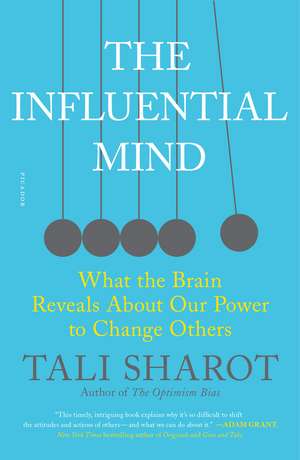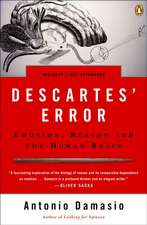The Influential Mind
Autor Tali Sharoten Limba Engleză Paperback – 4 sep 2018
In The Influential Mind, neuroscientist Tali Sharot takes us on a thrilling exploration of the nature of influence. We all have a duty to affect others--from the classroom to the boardroom to social media. But how skilled are we at this role, and can we become better? It turns out that many of our instincts--from relying on facts and figures to shape opinions, to insisting others are wrong or attempting to exert control--are ineffective, because they are incompatible with how people's minds operate. Sharot shows us how to avoid these pitfalls, and how an attempt to change beliefs and actions is successful when it is well-matched with the core elements that govern the human brain. Sharot reveals the critical role of emotion in influence, the weakness of data and the power of curiosity. Relying on the latest research in neuroscience, behavioral economics, and psychology, the book provides fascinating insight into the complex power of influence, good and bad.
| Toate formatele și edițiile | Preț | Express |
|---|---|---|
| Paperback (2) | 53.06 lei 3-5 săpt. | +26.34 lei 6-12 zile |
| Little Brown Book Group – aug 2018 | 53.06 lei 3-5 săpt. | +26.34 lei 6-12 zile |
| Pan Macmillan – 4 sep 2018 | 100.39 lei 3-5 săpt. | +20.78 lei 6-12 zile |
Preț: 100.39 lei
Nou
19.21€ • 20.93$ • 16.19£
Carte disponibilă
Livrare economică 03-17 aprilie
Livrare express 19-25 martie pentru 30.77 lei
Specificații
ISBN-10: 125015961X
Pagini: 256
Dimensiuni: 141 x 208 x 20 mm
Greutate: 0.23 kg
Editura: Pan Macmillan
Cuprins
1. (Priors) Does Evidence Change Beliefs? -- The Power of Confirmation and the Weakness of Data
2. (Emotion) How We Were Persuaded to Reach for the Moon -- The Incredible Sway of Emotion
3. (Incentives) Should You Scare People into Action? -- Moving with Pleasure and Freezing with Fear
4. (Agency) How You Obtain Power by Letting Go -- The Joy of Agency and the Fear of Losing Control
5. (Curiosity) What Do People Really Want to Know? -- The Value of Information and the Burden of Knowledge
6. (State) What Happens to Minds Under Threat? -- The Influence of Stress and the Ability of Overcome
7. (Others, part I) Why Do Babies Love iPhones? -- The Strength of Social Learning and the Pursuit of Uniqueness
8. (Others, part II) Is "Unanimous" as Reassuring as It Sounds? -- How to Find Answers in an Unwise Crowd
9. The Future of Influence? -- Your Mind in My Body
Descriere
Selected as a best book of 2017 by Forbes, The Times, Huffington Post, Bloomberg, Greater Good Magazine, Stanford Business School and more. 'A timely, intriguing book' Adam Grant, New York Times bestselling author of Originals and Give and Take'This profound book will change your life. An instant classic' Cass R.
Sunstein, bestselling co-author of NudgePart of our daily job as humans is to influence others; we teach our children, guide our patients, advise our clients, help our friends and inform our online followers. We do this because we each have unique experiences and knowledge that others may not. But how good are we at this role? It turns out we systematically fall back on suboptimal habits when trying to change other's beliefs and behaviors.
Many of these instincts-from trying to scare people into action, to insisting the other is wrong or attempting to exert control-are ineffective, because they are incompatible with how the mind operates.
























